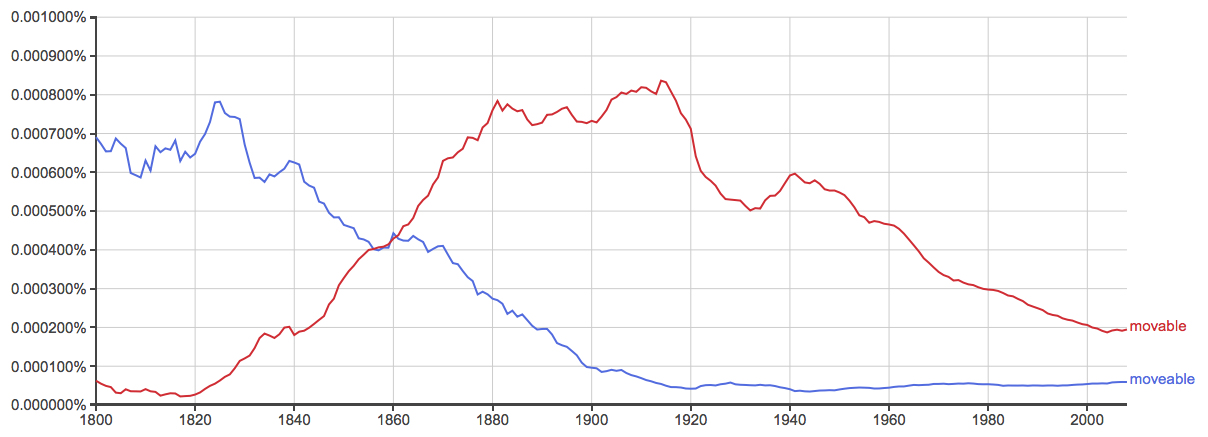Ernest Hemingway’s memoir, which consists of portraits of famous literary expatriates and sketches of the author’s life as a young man in Paris, is a fascinating read for anyone interested in Hemingway or the American literary golden age of the 1920s and 1930s.
Many readers are perplexed by its title, though. A Moveable Feast seems, at first glance, to contain an obvious spelling error.
Would a careful editor have used moveable or movable in the book’s title? Both of these spellings have been used in published books, but one is older and the other more modern.
What is the Difference Between Movable and Moveable?
In this post, I will compare movable vs. movable. I will use each of these words in at least one example sentence, and I will outline which is the modern spelling that you should use in your writing.
Plus, I will show you a helpful memory tool that you can use to decide between these two words in the future.
When to Use Movable
 What does movable mean? Movable is an adjective. It is a synonym of portable, meaning able to be taken from one spot and put in another.
What does movable mean? Movable is an adjective. It is a synonym of portable, meaning able to be taken from one spot and put in another.
Loaves of bread, television sets, and sofas are all movable because if you don’t like where they are, you can put them somewhere else. Buildings, lakes, and mountains are stuck where they are for the most part; they are permanent, or immovable.
For example,
- The driver’s seat in my car is movable; I can slide it forward to give a tall person in the backseat more legroom.
- The car may be broken down, but is it still movable if we get out and push?
- Designed for commercial settings, the system behind the hidden pool, known as a movable floor, is now being adapted for residential use by a handful of manufactures. –The Wall Street Journal
When to Use Moveable
 What does moveable mean? Moveable is a spelling variant of movable. It means the same thing and can be used in all of the same contexts.
What does moveable mean? Moveable is a spelling variant of movable. It means the same thing and can be used in all of the same contexts.
Moveable is an older spelling, but since the middle of the 19th century, movable (with only one e) has been the standard spelling in both British and American English.
See the chart below,

This chart graphs moveable vs. movable in American and British English books since the year 1800. It’s not completely exhaustive, but it does demonstrate a clear trend. In today’s writing, movable is the preferred spelling.
Ernest Hemingway and his editors apparently didn’t get the memo; his memoir was published posthumously in 1964 with the title A Moveable Feast.
Trick to Remember the Difference
Today, you should always spell this word movable, unless you are specifically referring to the title of Hemingway’s memoir. Movable is the standard spelling in both American and British English, and has been for over 150 years.
Imagine that the extra E in moveable stands for error, and you should be able to easily remember that movable is the standard spelling of this word in almost every context.
Of course, using the spelling moveable isn’t quite an error. It just using an older, outdated spelling, but the mnemonic will help you remember.
Summary
Is it movable or moveable? Movable and moveable are two spelling variants of the same adjective, which means able to be moved or repositioned.
- Moveable was more common until the mid-19th century.
- Today, movable is the standard spelling.
To conclude, use movable in every context except in reference to specific literary works, like the Hemingway memoir A Moveable Feast.
Contents
